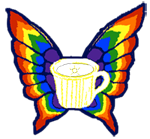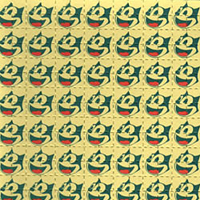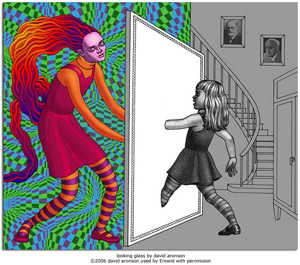Recreation
I am a recreational drug user. I take these substances because I enjoy having the kinds of experiences that they can engender. Sometimes I take drugs for social reasons, or as generalized intensifiers, or simply to relax. I do it because it feels good, in other words. And on some especially blessed occasions I simply do it for no particular reason at all.
I also take drugs therapeutically, of course. And I take them for self-exploration. I take them for reasons that relate to what I think of as my spirituality, too. I just wanted to speak openly about the recreational part for a minute, because I often hear people talking about how they only take drugs for “spiritual” reasons; and while in some cases this is absolutely true and totally valid, in other cases it seems either disingenuous or not thoroughly thought through to me.
When I think about how often I’ve had this discussion with people who were at the time puddled at some party, I’m strongly reminded of the folks who are so very proud to report that they only take “natural” drugs. I mean Datura is natural, right? And so are the cyanides for that matter. Almost everybody that I know of would much rather take a hit of good old-fashioned LSD than chow down on a big pile of ground-up nutmeg, and there are a number of excellent reasons for this. Many of those who vocalize their preference for natural drugs aren’t really afraid of artificial, lab-produced drugs as such; it’s just that they want to style their personal practice as especially pure and wholesome. We all want to feel like what we’re getting up to doesn’t have anything to do with the Drug Problem. Understandably, we want to distance ourselves from potential criticism, and some of us seek to accomplish this by projecting any perceived impropriety onto others–those “others” who take dangerous and dirty old lab drugs, for instance. Or the “others” who admit to consuming drugs for the sheer joy of it, rather than undertaking this onerous task for wholly metaphysical, therapeutic, or scientific reasons.
The Teafaerie defines recreation rather broadly. It means kicks, for sure. But social and interpersonal bonding also qualify as fun to me, as do heightened arousal and alchemically augmented sexy time. I love wandering around a forest or a festival with an open heart and preternaturally sharpened senses. I like the way that the world seems to bend itself to my whim when I fall into a certain sort of flow. One couldn’t ask for a more fascinating puzzle than our beautiful universe as seen through the psychedelic kaleidoscope, and gazing inward is as odd and interesting as looking out. Just feeling extra good in my body is fun to me. Trance dancing is fun. Making art is fun. I could list off such enhanced fun stuff all day, really, because psychedelics often take me back to a childlike state of wonder in which everything I encounter makes a vivid and delightful impression upon my wide-open mind.
Takings drugs isn’t always fun, obviously. One’s choice of materials can play a big role, as can dosage, set, and setting. I’d never approach an ayahuasca journey with the casual flippancy with which I might toss back a couple of cold brewskis, for instance. And smoked DMT is never any fun for me at all! Amazing, yes. Mind-blowing, awe-inspiring, fascinating, revealing, ecstatic, even–yes, yes, yes, yes, and yes. But for me the word fun suggests an almost total absence of abject terror, and I haven’t quite made it to that point yet. And of course there are situations when psychedelics are decidedly un-fun. Like when one takes too much of something, or when an unusual reaction occurs, or when one finds oneself in an inappropriate environment. Drugs have played a starring role in some of my most unspeakably upsetting experiences over the years, and I would be remiss in my duties if I failed to mention that glaring fact. I don’t think that it was my fun-loving attitude that spun me wrong, though. Indeed, two out of my three most bogus bummers of all time were embarked upon with as much ceremony, ritual, and carefully thought-out intention as those involved could reasonably have been expected to muster. In one of those situations my friends and I really should have had a sitter. In the second situation, it was a case of substance misidentification, which I would have taken far more seriously if I had done my homework. (I probably would have passed on taking it, or I surely would have taken less.) With the third bummer trip, I did absolutely everything right and I just got sideswiped by unexpectedly intense content. In this last instance my intention had nothing to do with fun at all. I went in looking for demons and I found some, by gosh! Perhaps there’s a lesson in there somewhere. In any event, I’ve consistently tended to get myself into hotter water when I was trying to do real heavy spiritual work over the years than I have when I’ve taken drugs in lighthearted social contexts, mainly because I tend to take heroic doses when I’m really going for the gold, whereas I’m often inclined to dose down in public in order to keep up appearances.
I’m super excited about the legal psychedelic studies that are going on right now, but it bothers me that they have mainly been directed at trying to cure some sort of a problem. Don’t get me wrong; I’m glad that folks are getting help with their PTSD and end-of-life anxiety issues. But wouldn’t it be wonderful if our doctors were allowed to explore possible power-ups for people who are already near the top of their game? Is it that we’re going to have to get normalcy officially classified as a disease in order to be allowed to treat it? I can just see millions of people suddenly realizing that they’ve been stricken with Telepathic Insensitivity, Hyperspatial Occlusion, and a common but fully treatable form of Time Blindness that causes the sufferer to experience life as a linear sequence of causally determined events.
Drugs and sex have a lot in common. They’re both highly pleasurable boundary-dissolving experiences capable of moving us on a level that can transcend our cultural programming, and the puritanical response to their influence is often strongly proscriptive. For example, I was raised to believe that sex that occurred for the purposes of procreation within marriage was sacred and holy, whilst a quickie in the closet at a party was a filthy and despicable act of self-degradation.
Now I happen to enjoy the occasional quickie as much as the next gal, but I acknowledge that if quickies were the only kind of sex that I’d ever had, I’d be missing out on the best of what sex has to offer. Likewise, if I were engaging in this otherwise salubrious activity with strangers instead of partners, or if I wasn’t using protection, or if the closet in question happened to be full of razor-sharp knives and poisonous cobras (or whatever), I could fairly be said to be courting disaster.
I think of recreational drug use much the same way as I think about casual sex. Which is to say that I consider it to be a potentially marvelous thing for all concerned, provided that the practitioners use good judgment and take all of the appropriate precautions. Good judgment implies a thorough analysis of set and setting. It means knowing my own emotional state. It means knowing the person or people that I’m interacting with. It means talking about risk factors and setting good ground rules. It means making sure that I’m in a safe place where I’m not likely to attract unwanted attention. It means treating myself with respect and demanding an appropriate degree of respect from others even (and maybe especially) when the activity that I’m engaged in is considered to be out of bounds relative to the rules of “respectable” culture. Sometimes folks get sloppy when they don’t have enough respect for their own practice, and they end up making matters worse by adopting an “anything goes” attitude. I’ve seen plenty of people make stupid choices because they felt like they were already doing something bad in the first place, and once they had dispensed with their self respect they seemed to abandon the ability to discriminate altogether.
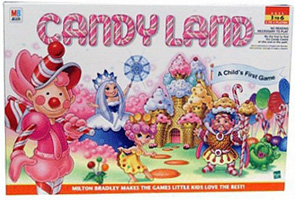
Which is why I consider it important to publicly admit to my recreational drug use. Fun and pleasure have a tendency to get a bad rap in our culture. There’s nothing wrong with many drugs when used safely in moderation, and there’s certainly nothing wrong with fun. I don’t think that we need to draw a distinction between “serious” and “recreational” drug use so much as we need to drawn a distinction between responsible drug use and irresponsible. Because there is something wrong with being irresponsible. Indiscriminate use endangers both the user and others, and it also tends to make psychedelics look bad in general. If you just want to get fucked up, I suppose that you have a right to do that; but if you make a spectacle out of yourself in public, you’ll end up being part of the reason why cops, bosses, teachers, and parents worry so much about recreational drug use. And if you do it in private you could still get hurt and require medical intervention. Doctors tend to look down their noses at recreational drug users, too, often for good reasons. I’d like to see a world where things were different, though.
I’d like to see a world where people could proudly admit to thoughtfully altering their own consciousnesses for any reason that they see fit. I’d like to see the legal restrictions against doing so lifted, in part because I really do believe that people who already feel sketchy about what they’re doing are inclined to make less wholesome decisions. There will always be problematic use, of course, but the same thing holds true for alcohol. Society at large, however, does not condemn the recreational use of alcohol. We condemn the destructive actions that can result from the irresponsible use of alcohol. We condemn drunk driving and domestic violence and destroying one’s liver and behaving like an obnoxious douchebag. We encourage addicts to get treatment–as well we should. But we don’t freak out if we hear that our friends had a few beers when they went out dancing last weekend. Because there’s nothing wrong with responsibly adjusting our own nervous systems, even when the only goal is to have a good time.
I do respect the wisdom behind the idea of holding a clear intention, but there’s also a level at which I reject the idea of establishing any sort of a goal for my practice. I’ve read a lot of books about meditation and it seems like the masters are always getting down on the students who declare that they are trying to meditate for a specific reason. Like say the student is meditating to try to attain enlightenment; the master is forever affirming that the student should just be meditating for the experience of the moment itself, rather than trying to reach some goal that’s outside of that moment. So when people ask me why I trip, I don’t always even like to say that it’s for fun. What the experience really is for me is incredibly hard to put into words. So sometimes I intentionally try to enjoy it just for its own sake without feeling like I have to label my reasons at all.
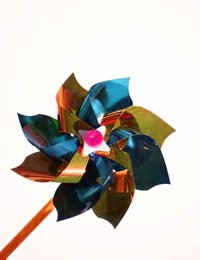
I teach flow arts for a living. Which means that I mostly remind adults about how to play well. I think that play and self-discovery are vitally important to the human experience. In its purest expression, play can be both sacred and profound. It can be healing, too! I’m very serious about play. Or at least I’m entirely sincere about it. The idea that you have to work hard to get anywhere and that you have to earn every deep insight is just plain wrong, in my experience. Many of my best and most important discoveries have naturally unfolded in the context of relaxed and open-ended self-exploration. Some have been gratuitous graces. And if nothing useful comes out of a particular session (rare!), but in the end I’ve had a truly epic or even delightfully pleasurable day, then I still characterize the experience as a success. If I had spent the day pleasuring a friend I would be considered a hero. Am I any less worthy of being treated to a good time than my friends are?
The Teafaerie is playing this game as if we’re all going to end up getting to share our memories. I don’t know if it just works that way, or if we’re somehow going to build that capacity ourselves with the aid of emerging technologies. Most probably it’s just a load of bullshit that I whipped up to serve the function that would normally be covered by a religious mythology. I take it pretty seriously as a moral compass, though. It promotes right action. One is reluctant to bomb people if one believes that one is going to share those people’s experiences someday. In fact, one becomes strongly inclined to make overwhelming amounts of awesome for the greatest number of people possible! Or maybe our collective experiences will turn out to be browsable, in which case I’m playing to get a whole lot of hits on my memories. Sometimes when I have a peak experience, I feel like my future self is watching it on replay through my eyes. Others maybe, too. I know that it’s probably an illusion, but it’s one that I’m particularly fond of.
My understanding of the Balinese philosophy is that when one is doing something particularly beautiful, one attracts the pleased attention of the gods, who observe our actions both from the outside and from within. Attracting more of the gods’ attention is said to result in more favor or more manifestation power. Granted, I may be getting the details wrong here, since my knowledge came from an explanation given by a Balinese taxi driver, but it feels right to me. Or at least I find it amusing.
If there is a higher purpose in life than creating good memories for all concerned, it has not yet been successfully demonstrated to me. I believe that this is a playful universe and I think that the state of relaxed, responsive, and engaged focus at the root of play is indispensable. Wild ecstatic joy and dumbfounded wonder are vitally important to us. Our survival may very well depend upon how much bright enthusiasm for life we’re able to raise up on this starship–and real damn fast.
So the next time you hear someone bemoaning the scourge of recreational drug users, ask them if what they’re talking about isn’t actually irresponsible drug use. Because recreation, after all, is really a rather lovely word. I’d hate to see it get short shrift. Recreation literally means trying to create myself anew. And that’s as positive and as valid a description of my practice as anything else that I’ve been able to come up with.


